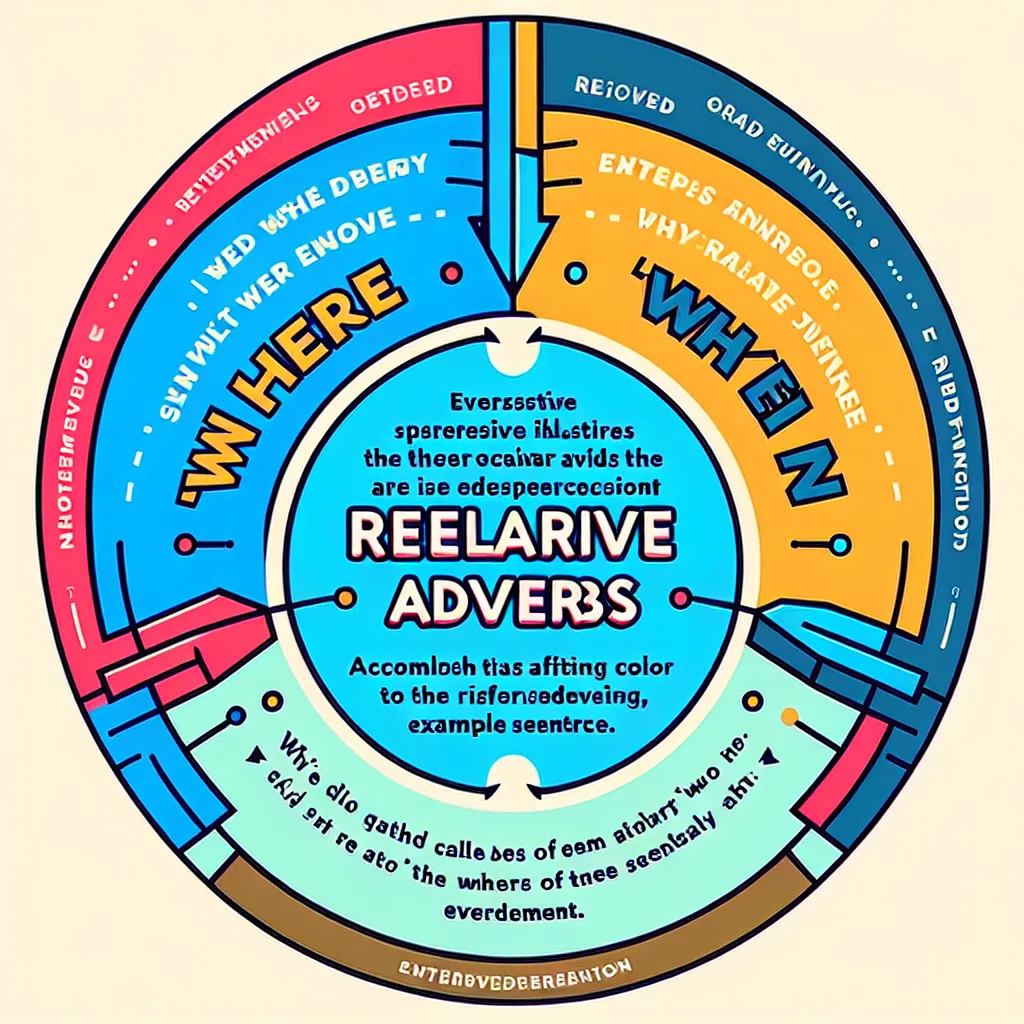Relative adverbs are essential components of English grammar that help create more complex and informative sentences. Understanding how to use them correctly can significantly improve your language skills and enhance your ability to express ideas clearly. In this comprehensive guide, we’ll explore the ins and outs of relative adverbs, providing you with practical tips and examples to master their usage.
What Are Relative Adverbs?
Relative adverbs are words that introduce relative clauses and provide additional information about time, place, or reason in a sentence. The three main relative adverbs in English are:
- Where (for place)
- When (for time)
- Why (for reason)
These adverbs connect a dependent clause to an independent clause, adding more context to the sentence.
 Relative Adverbs Diagram
Relative Adverbs Diagram
How to Use Relative Adverbs
1. Using “Where” for Place
The relative adverb “where” is used to refer to a place mentioned in the main clause. It replaces prepositions like “in which,” “at which,” or “to which” when referring to a location.
Example:
- This is the restaurant where we had our first date.
- I love visiting cities where I can explore historical landmarks.
2. Using “When” for Time
“When” is used to refer to a time or occasion mentioned in the main clause. It can replace phrases like “at which time” or “on which day.”
Example:
- Do you remember the day when we first met?
- Summer is the season when I feel most energetic.
3. Using “Why” for Reason
“Why” is used to give a reason for something mentioned in the main clause. It can often replace “for which reason” or “for which.”
Example:
- This is the reason why I decided to study abroad.
- I don’t understand why she left without saying goodbye.
Common Mistakes to Avoid
When using relative adverbs, be aware of these common errors:
- Confusing relative adverbs with relative pronouns (who, whom, which, that)
- Using unnecessary prepositions before relative adverbs
- Forgetting to use a comma before non-restrictive relative clauses
Example of correct usage:
- The hotel where we stayed (correct)
- The hotel in where we stayed (incorrect – unnecessary preposition)
Practice Exercises
To reinforce your understanding of relative adverbs, try these exercises:
-
Fill in the blanks with the appropriate relative adverb:
- This is the reason _____ I couldn’t attend the meeting.
- The town _____ I grew up has changed a lot.
- Do you recall the moment _____ you realized your passion?
-
Combine the following sentences using relative adverbs:
- This is the park. We often have picnics here.
- I’ll never forget the day. I graduated on that day.
- There’s a good reason. He didn’t accept the job offer for that reason.
 Relative Adverb Exercises
Relative Adverb Exercises
Advanced Usage of Relative Adverbs
For those looking to further enhance their English skills, consider these advanced applications of relative adverbs:
-
Using relative adverbs in formal writing:
- The conference, where leading experts will present their findings, is scheduled for next month.
-
Combining relative adverbs with other complex structures:
- The moment when I realized the importance of education was also when I decided to pursue a Ph.D.
-
Using relative adverbs in conditional sentences:
- If you visit the place where I grew up, you’ll understand why I love nature so much.
For more advanced sentence structures and modifiers, you might find our guide on how to use advanced sentence modifiers helpful.
Conclusion
Mastering the use of relative adverbs is crucial for constructing more sophisticated and informative sentences in English. By understanding when and how to use “where,” “when,” and “why,” you can add depth and clarity to your writing and speech. Remember to practice regularly and pay attention to how these adverbs are used in native English content. With time and effort, you’ll find yourself using relative adverbs naturally and confidently.
We encourage you to practice using relative adverbs in your own sentences and share them in the comments below. Keep exploring other aspects of English grammar to continually improve your language skills!



